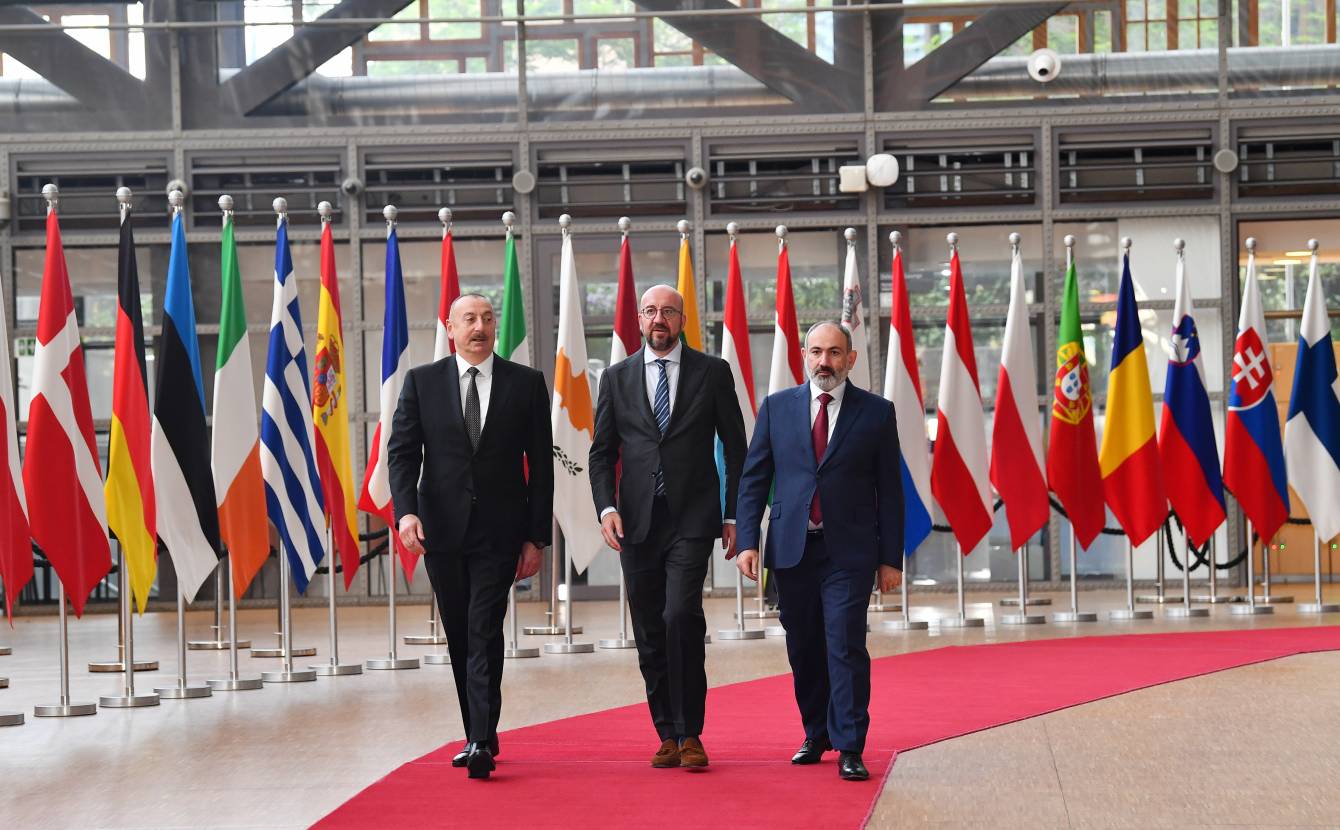Azerbaijan’s President Ilham Aliyev and Armenian Prime Minister Nikol Pashinyan discussed key issues during a tripartite meeting hosted by European Council (EC) President, Charles Michel, on Sunday.
The third meeting of its kind between the two sides covered several matters of mutual interest, namely border delimitation, transport communications, a peace agreement between Azerbaijan and Armenia, as well as the socio-economic development in the two South Caucasus countries.
President Michel called the meeting “productive” and leading to “tangible progress” in normalizing the ties between the two nations.
“The first joint meeting of the Border Commissions will take place on the inter-state border in the coming days. It will address all questions related to the delimitation of the border and how best to ensure a stable situation,” Michel said in a statement released by the European Council press service on May 22.
The EC president said Aliyev and Pashinyan also agreed to proceed with unblocking the transport links, including the transit between Azerbaijan’s western regions and its southwestern Nakhchivan exclave, and between different parts of Armenia via Azerbaijan, as well as enabling international transport via their domestic communications infrastructure.
The significant part of the state border of Azerbaijan with Armenia, measuring 1,007 kilometers in length, remained out of the country’s control for nearly 30 years after Azerbaijan’s Karabakh (Garabagh) region fell under the illegal Armenian occupation in the early 1990s. Following the Soviet Union’s dissolution in 1991, Armenia launched full-blown military aggression against Azerbaijan, marking the longest and deadliest war in the South Caucasus region. The bloody war ended with a ceasefire in 1994, which saw Armenia forcibly occupying 20 percent of Azerbaijan’s internationally recognized territories. Over 30,000 Azerbaijanis were killed, 3,890 went missing, and one million others were expelled from those lands in a brutal ethnic cleansing policy conducted by Armenia.
The occupation also aggravated the isolation of the Nakhchivan Autonomous Republic from Azerbaijan’s mainland. Armenia has closed almost all kinds of inbound and outbound communication links, including transport, humanitarian, and energy to and from Nakhchivan putting it in a blockade. Azerbaijan has been using the territories of Iran and Turkey for reaching Nakhchivan so far.
On September 27, 2020, the decades-old conflict between the two countries intensified after Armenia's forces deployed in occupied Azerbaijani lands shelled military positions and civilian settlements of Azerbaijan. During counter-attack operations that lasted 44 days, Azerbaijani forces liberated over 300 settlements, including the cities of Jabrayil, Fuzuli, Zangilan, Gubadli, and Shusha, from nearly a 30-year-long illegal Armenian occupation. The war ended in a tripartite statement signed by Armenia, Azerbaijan, and Russia on November 10, 2020. Under the statement, Armenia also returned the occupied Aghdam, Kalbajar, and Lachin districts to Azerbaijan.
Post-war border protection works of the Azerbaijani army faced hostile backlash from the Armenian side since May 2021. Yerevan blamed Azerbaijani forces for the so-called “encroaching” on Armenia’s territory. Armenia’s military conducted numerous provocations against the Azerbaijani army, resulting in severe complications on the frontier.
In response to Yerevan’s baseless accusations, Baku has been publicly calling for the delimitation and demarcation of the Armenia-Azerbaijan state border. In February 2022, Baku submitted a proposal containing five basic principles to Armenia, which, among others, focuses on delimitation and demarcation of the state border between the countries. On April 23, the Azerbaijani authorities announced that the composition of the national commission for the delimitation and demarcation of the Armenian-Azerbaijani border and a delegation to draft the peace agreement between the two countries was determined.
In the meantime, the connection between Azerbaijan’s mainland and Nakhchivan should be restored in the Zangazur corridor. Before the First Karabakh War in 1991-1994, there was a railway connection between Azerbaijan’s capital Baku and Nakhchivan. However, it was destroyed and looted by Armenians during the years of occupation of Azerbaijan’s Fuzuli, Jabrayil and Zangilan districts.
Azerbaijan has been restoring the Horadiz-Aghband railroad that stretches to the Armenia-Azerbaijan state border in the country’s Zangilan district as an integral part of the Zangazur corridor. The project is being implemented in three stages totaling 110.4 kilometers in length. The railway is expected to go online some time in 2023.







 The number of evacuees from flooded areas in Kazakhstan has reached 97,852 people, including about 32,856 children since March 27.
The number of evacuees from flooded areas in Kazakhstan has reached 97,852 people, including about 32,856 children since March 27.
 The Islamic holy month of fasting, Ramadan comes to an end this week with the celebration of a joyous festival called Eid (meaning “festival” in Ar...
The Islamic holy month of fasting, Ramadan comes to an end this week with the celebration of a joyous festival called Eid (meaning “festival” in Ar...
 Iran's senior military leaders described the drone and missile attack on Israel on April 14 night as “successful".
Iran's senior military leaders described the drone and missile attack on Israel on April 14 night as “successful".
 Iranian President Ebrahim Raisi warned Israel that it would face a "real and extensive" response if it makes any "mistake" following Tehran’s missi...
Iranian President Ebrahim Raisi warned Israel that it would face a "real and extensive" response if it makes any "mistake" following Tehran’s missi...



